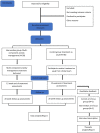Evaluation of a novel, multicomponent anxiety management programme for people with intellectual disability: protocol for a mixed-methods, quasi-experimental feasibility study
- PMID: 37730412
- PMCID: PMC10514669
- DOI: 10.1136/bmjopen-2023-078411
Evaluation of a novel, multicomponent anxiety management programme for people with intellectual disability: protocol for a mixed-methods, quasi-experimental feasibility study
Abstract
Introduction: Studies have shown some benefits to single approaches to psychological therapies for the treatment of anxiety in people with intellectual disability such as modified cognitive-behavioural therapy and mindfulness. To our knowledge, no studies have used a multicomponent approach for the individual treatment of anxiety-related disorders in this population group. A co-production group of clinical experts and people with intellectual disability has created a novel multicomponent anxiety management programme (MCAMP-ID). The aims of this study are to investigate (1) the feasibility of this approach in reducing anxiety for people with a mild/moderate intellectual disability, (2) the feasibility of outcome measures and (3) the feasibility of completing a future randomised controlled trial of this programme. The data from this feasibility study will be used to inform trial design and to complete power calculation.
Methods and analysis: Sixty people with intellectual disability will be invited to participate in the study across four intellectual disability services within one mental health trust in Northwest England. The specialist services will deliver either treatment as usual (TAU) or the novel intervention (MCAMP-ID). MCAMP-ID comprises of 10 individual sessions delivered by a member of the clinical team once a week for between 10 and 12 weeks. TAU will be based on standard treatment currently delivered to meet the person's specific needs. The outcomes of the study will be feasibility of recruitment, attrition, adherence to the programme and suitability of outcome measures. A mixed-methods approach will be used to assess outcomes.
Ethics and dissemination: The study received approval from the Research Ethics Committee and Health Research Authority (23/EM/0044) through the Integrated Research Application System (IRAS ID: 315557) in March 2023. Participants will provide informed consent before taking part. Study findings will be presented at conferences and published within a peer-reviewed journal.
Trial registration number: ISRCTN16062949.
Keywords: anxiety disorders; feasibility studies; mental health; patient-centered care; protocols & guidelines.
© Author(s) (or their employer(s)) 2023. Re-use permitted under CC BY. Published by BMJ.
Conflict of interest statement
Competing interests: None declared.
Figures
Similar articles
-
Individual cognitive stimulation therapy for people with intellectual disability and dementia: protocol of a feasibility randomised controlled trial.BMJ Open. 2018 Dec 9;8(12):e022136. doi: 10.1136/bmjopen-2018-022136. BMJ Open. 2018. PMID: 30530576 Free PMC article. Clinical Trial.
-
Cognitive behaviour therapy (CBT) for anxiety and depression in adults with mild intellectual disabilities (ID): a pilot randomised controlled trial.Trials. 2011 Apr 14;12:95. doi: 10.1186/1745-6215-12-95. Trials. 2011. PMID: 21492437 Free PMC article. Clinical Trial.
-
Group cognitive stimulation therapy versus usual care for people with intellectual disabilities and dementia (CST-IDD) in the UK: protocol for a mixed-methods feasibility randomised controlled trial.BMJ Open. 2023 Apr 28;13(4):e072391. doi: 10.1136/bmjopen-2023-072391. BMJ Open. 2023. PMID: 37116994 Free PMC article.
-
Interventions for adults with a history of complex traumatic events: the INCiTE mixed-methods systematic review.Health Technol Assess. 2020 Sep;24(43):1-312. doi: 10.3310/hta24430. Health Technol Assess. 2020. PMID: 32924926 Free PMC article.
-
Behavioural interventions to treat anxiety in adults with autism and moderate to severe intellectual disabilities: The BEAMS-ID feasibility study.J Appl Res Intellect Disabil. 2024 Sep;37(5):e13282. doi: 10.1111/jar.13282. J Appl Res Intellect Disabil. 2024. PMID: 39074852 Review.
References
-
- Smiley E. Epidemiology of mental health problems in adults with learning disability: an update. Adv Psychiatr Treat 2005;11:214–22. 10.1192/apt.11.3.214 - DOI
Publication types
MeSH terms
Associated data
Grants and funding
LinkOut - more resources
Full Text Sources

